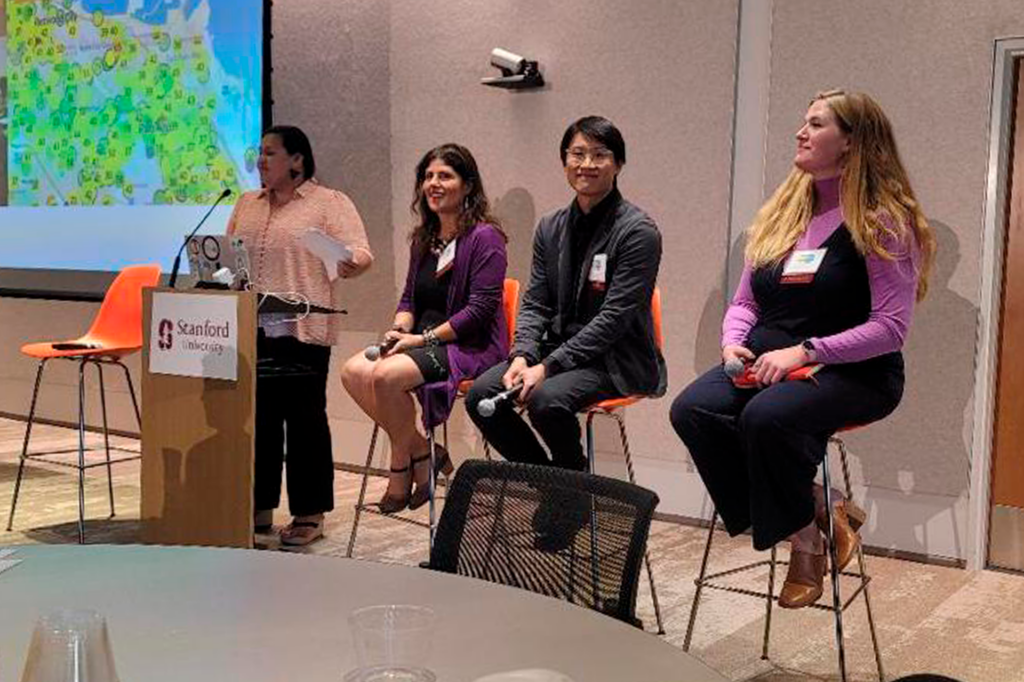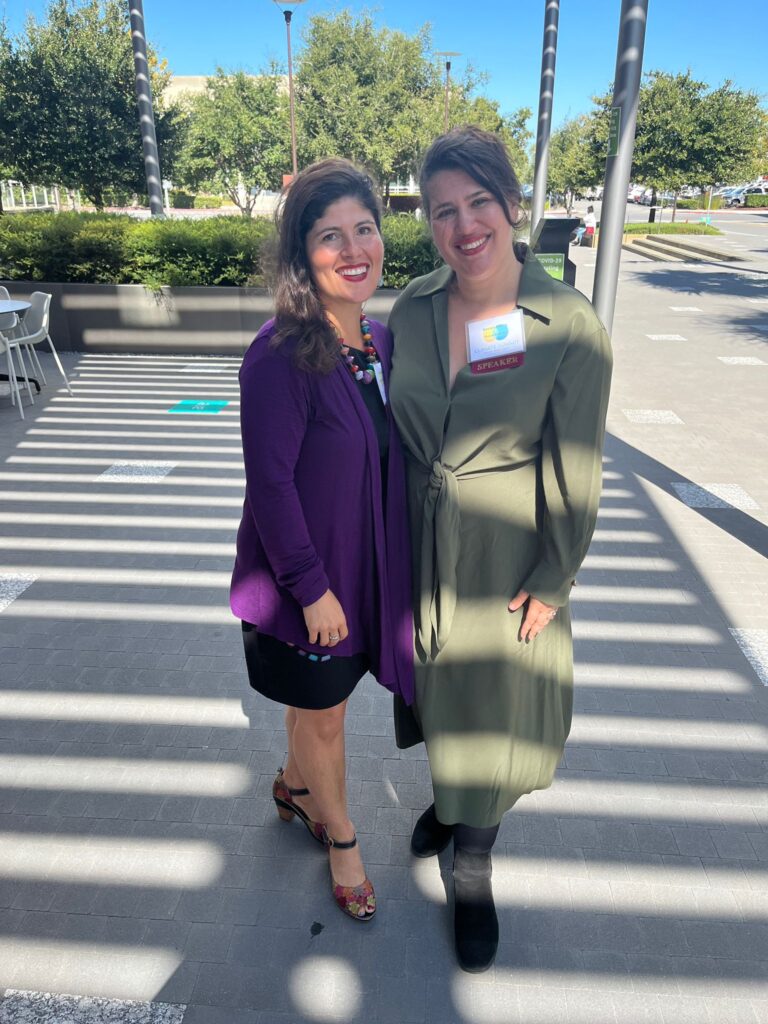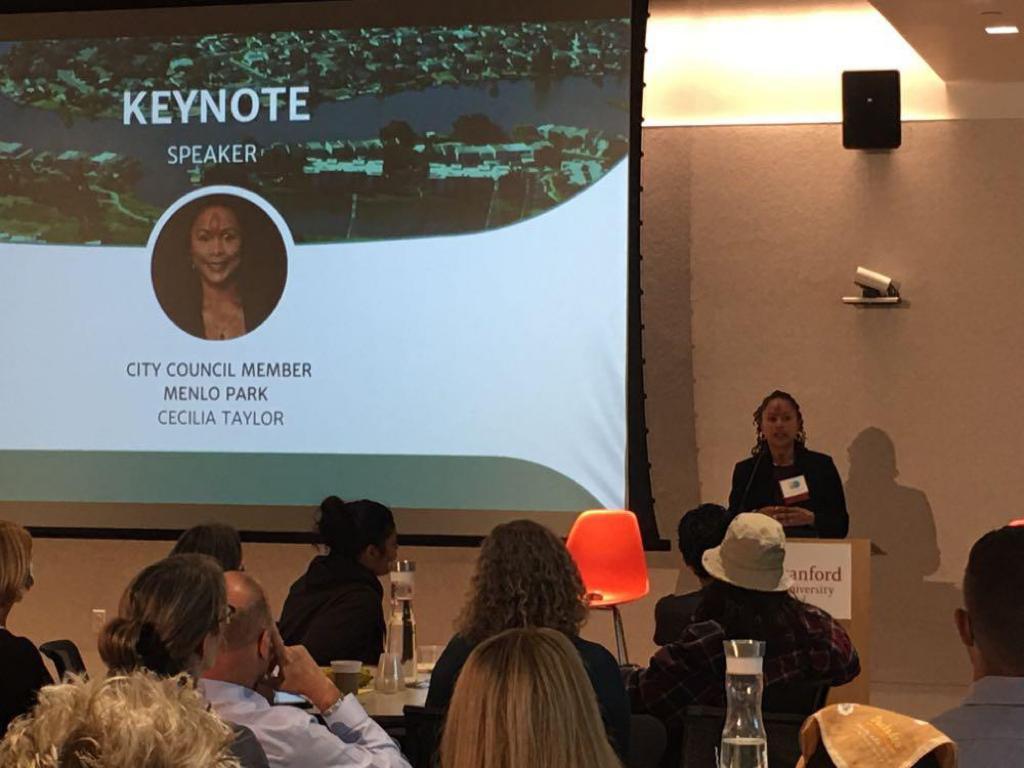
On Monday, October 3, the first climate summit was held in San Mateo that seeks to create a collective commitment to climate adaptation and equity. The summit was organized by Thrive Alliancein conjunction with Climate Resilient Communities, Our House and Rise South City.
The summit addressed the adaptation needs of the county's communities as well as strategies to be at the forefront of the fight against climate change.
The day began with a brief breakfast where there was space and time to create alliances among attendees from different civil society organizations, local government workers, foundation representatives, as well as Stanford academics.
Georgia Farooq, executive director of Thrive Alliance, gave the welcome remarks to begin the presentations of the various speakers attending the summit.

Jonathan Cordero is the metush (director or president) of the Ramaytush Ohlone organization, and spoke about the recognition of the land on which the summit was held, belonging to the native Ramaytush Ohlone people.
The keynote address was given by Cecilia Taylor, councilwoman for Menlo Park District 1, who also seeks to improve safety, economic development and equity in her district.
"Most of what we live through is rooted in racism, we can't deny it," she said.
Cecilia Taylor

The summit focused on raising awareness of adaptation needs in San Mateo County's frontline communities, learning how to bring communities and community-based organizations to the forefront of addressing climate change in the county.
Natalie Herbert, a postdoctoral researcher at the Stanford Woods Institute for the Environment, noted the importance of having data to achieve environmental justice.
Dr. Desiree LaBeaud, a professor at Stanford University and co-founder of HERI-Kenya, spoke about the importance of making a change for future generations: "I care deeply about our children. Children really need safe, stable and nurturing environments to grow and learn and thrive. They can be stressed by what's going on in their homes, what's going on in their community. But also what's happening outside, in the environment."
In addition, she explained that the impacts of climate change are felt throughout our bodies, not only in our respiratory systems due to smoke from forest fires, pollen and air pollution that cause respiratory problems, but also in the mental health of children.
"We all know that every child born today will be affected by climate change and that the decisions we make now, and how we come together, will determine the future for all of us and all future generations."
The need to support the most vulnerable populations was much pointed out at the summit. Like Taylor, LaBeaud stressed that “climate change, vulnerability, health and equity are closely related. Populations may be vulnerable due to their physiology and age. But populations are also vulnerable because of racism, equality and poverty.
For his part, Derek Ouyang, designer, engineer, and educator; research manager at Stanford's Regulation, Assessment and Governance Lab, noted that "by the end of the century, we should expect 2 feet or more of sea level rise in the Bay Area, so any kind of wave action that happens is more likely to tip over the edge and affect the communities fronting the Bay."
Ouyang added that, in the near future, climate change damages from flooding and sea level rise could cost the San Mateo County alone a billion of dollars a year or more.
"It's a big problem, but that tends to focus the impact and policymaking around big infrastructure projects that can address that. And by engaging deeply with communities, we shift our whole perspective to focus on the household that has some kind of income that maybe goes primarily to necessary expenses like food, housing, health care, transportation, and maybe they have a rainy day fund that they're saving for little by little, but when that rainy day actually happens, then those savings can be depleted."
The above, he noted, may result in displacement of people from the Bay Area.
Derek Ouyang
Following the morning speakers, the afternoon continued with the Local Leadership Panel: Shifting Power to Frontline Communities, moderated by Miriam Yupanqui, Executive Director of Nuestra Casa with speakers Irma Rodriguez Mitton, Executive Director of South Coast Sustainable; Ever Rodriguez, founding president of North Fair Oaks Community Alliance; and Regina Wallace Jones, Councilwoman and former Mayor of East Palo Alto.
The objective of the panel was to discuss building stronger relationships between communities and all sectors to change power dynamics.
Finally, speakers Carolyn Bloede, Director of the San Mateo County Office of Sustainability; Laura Tam, Program Manager, Resources Legacy Fund spoke about resources as well as funding. The panel was moderated by Julio Garcia, Executive Director of Rise South City.
On that panel, Dana Brechwald, Director of the Adapting to Rising Tides Program at the Bay Conservation and Development Commission (BCDC) says that "the agency will pay environmental/community justice consultants the same hourly rate that consultants receive (rather than an allowance it says is not commensurate with their expertise and time)."
The first climate summit in San Mateo County closed with a commitment to create a collective agreement to ensure that the county's communities are prepared for and protected against climate change.
You may be interested in: First Annual San Mateo County Climate Summit to be Held


